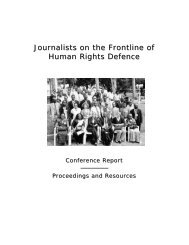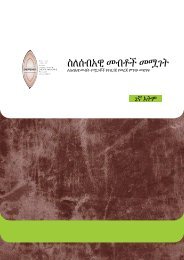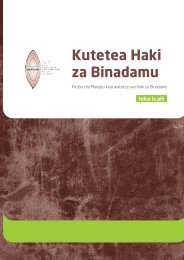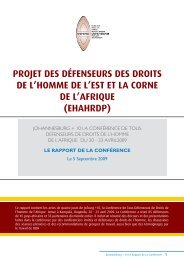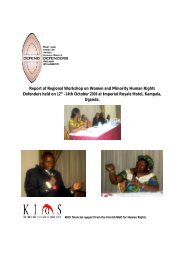Difaaca Xuquuqda Aadanaha - East and Horn of Africa Human ...
Difaaca Xuquuqda Aadanaha - East and Horn of Africa Human ...
Difaaca Xuquuqda Aadanaha - East and Horn of Africa Human ...
Create successful ePaper yourself
Turn your PDF publications into a flip-book with our unique Google optimized e-Paper software.
Article 12<br />
1. Everyone has the right, individually <strong>and</strong> in association with others, to participate in peaceful activities<br />
against violations <strong>of</strong> human rights <strong>and</strong> fundamental freedoms.<br />
2. The State shall take all necessary measures to ensure the protection by the competent authorities <strong>of</strong><br />
everyone, individually <strong>and</strong> in association with others, against any violence, threats, retaliation, de facto<br />
or de jure adverse discrimination, pressure or any other arbitrary action as a consequence <strong>of</strong> his or her<br />
legitimate exercise <strong>of</strong> the rights referred to in the present Declaration.<br />
3. In this connection, everyone is entitled, individually <strong>and</strong> in association with others, to be protected<br />
effectively under national law in reacting against or opposing, through peaceful means, activities <strong>and</strong><br />
acts, including those by omission, attributable to States that result in violations <strong>of</strong> human rights <strong>and</strong><br />
fundamental freedoms, as well as acts <strong>of</strong> violence perpetrated by groups or individuals that affect the<br />
enjoyment <strong>of</strong> human rights <strong>and</strong> fundamental freedoms.<br />
Article 13<br />
Everyone has the right, individually <strong>and</strong> in association with others, to solicit, receive <strong>and</strong> utilize resources<br />
for the express purpose <strong>of</strong> promoting <strong>and</strong> protecting human rights <strong>and</strong> fundamental freedoms through<br />
peaceful means, in accordance with article 3 <strong>of</strong> the present Declaration.<br />
Article 14<br />
1. The State has the responsibility to take legislative, judicial, administrative or other appropriate<br />
measures to promote the underst<strong>and</strong>ing by all persons under its jurisdiction <strong>of</strong> their civil, political,<br />
economic, social <strong>and</strong> cultural rights.<br />
2. Such measures shall include, inter alia:<br />
(a) The publication <strong>and</strong> widespread availability <strong>of</strong> national laws <strong>and</strong> regulations <strong>and</strong> <strong>of</strong> applicable basic<br />
international human rights instruments;<br />
(b) Full <strong>and</strong> equal access to international documents in the field <strong>of</strong> human rights, including the periodic<br />
reports by the State to the bodies established by the international human rights treaties to which it is a<br />
party, as well as the summary records <strong>of</strong> discussions <strong>and</strong> the <strong>of</strong>ficial reports <strong>of</strong> these bodies.<br />
3. The State shall ensure <strong>and</strong> support, where appropriate, the creation <strong>and</strong> development <strong>of</strong> further<br />
independent national institutions for the promotion <strong>and</strong> protection <strong>of</strong> human rights <strong>and</strong> fundamental<br />
freedoms in all territory under its jurisdiction, whether they be ombudsmen, human rights commissions<br />
or any other form <strong>of</strong> national institution.<br />
Article 15<br />
The State has the responsibility to promote <strong>and</strong> facilitate the teaching <strong>of</strong> human rights <strong>and</strong> fundamental<br />
freedoms at all levels <strong>of</strong> education <strong>and</strong> to ensure that all those responsible for training lawyers, law<br />
enforcement <strong>of</strong>ficers, the personnel <strong>of</strong> the armed forces <strong>and</strong> public <strong>of</strong>ficials include appropriate elements <strong>of</strong><br />
human rights teaching in their training programme.<br />
Article 16<br />
Individuals, non-governmental organizations <strong>and</strong> relevant institutions have an important role to play in<br />
contributing to making the public more aware <strong>of</strong> questions relating to all human rights <strong>and</strong> fundamental<br />
freedoms through activities such as education, training <strong>and</strong> research in these areas to strengthen further,<br />
inter alia, underst<strong>and</strong>ing, tolerance, peace <strong>and</strong> friendly relations among nations <strong>and</strong> among all racial <strong>and</strong><br />
religious groups, bearing in mind the various backgrounds <strong>of</strong> the societies <strong>and</strong> communities in which they<br />
carry out their activities.<br />
<strong>Difaaca</strong> <strong>Xuquuqda</strong> <strong>Aadanaha</strong>: Buug Xambaarsan Macluumaad loogu Talogalay <strong>Difaaca</strong>yaasha <strong>Xuquuqda</strong> <strong>Aadanaha</strong> | Caddadka 2aad<br />
57



